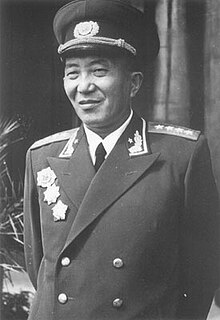Luo Ruiqing
| Luo Ruiqing | |
|---|---|

General Luo Ruiqing
|
|
| Nickname(s) | Luo the Tall |
| Born | May 31, 1906 Nanchong, Sichuan, China |
| Died | August 3, 1978 (aged 72) Heidelberg, West Germany |
| Allegiance |
|
| Service/branch |
|
| Years of service | 1928–1966 |
| Rank | Grand General |
| Commands held | Commander-in-chief of the 2nd Army Group, North China, Chief of Joint Staff |
| Battles/wars | Northern Expedition, Long March, Hundred Regiments Offensive, Chinese Civil War, Korean War, Sino-Indian War |
| Awards |
|
| Other work | Politician, Writer |
| Luo Ruiqing | |||||||||
| Traditional Chinese | 羅瑞卿 | ||||||||
|---|---|---|---|---|---|---|---|---|---|
| Simplified Chinese | 罗瑞卿 | ||||||||
|
|||||||||
| Transcriptions | |
|---|---|
| Standard Mandarin | |
| Hanyu Pinyin | Luó Ruìqīng |
| Wade–Giles | Lo Jui-ch'ing |
Luo Ruiqing (May 31, 1906 – August 3, 1978), formerly romanized as Lo Jui-ch'ing, was a Chinese army officer and politician, general of the People's Liberation Army. He created the People's Republic of China's security and police apparatus after the Communist victory in the civil war in his capacity as the first Minister of Public Security from 1949 to 1959, and then served as Chief of Joint Staff from 1959 to 1965, achieving military victory in the Sino-Indian War.
Despite being a close associate and supporter of Mao Zedong for decades, Luo was targeted and purged during the Cultural Revolution, which he opposed from the very beginning.
Luo Ruiqing was born in Nanchong, Sichuan in 1906, and joined the Communist Party of China in 1928, at the age of 22. He was the eldest son of a wealthy landlord named Luo Chunting (罗春庭), who had a total of six children. However, Luo Chunting was an opium addict and lost all of his wealth due to his addiction, and the entire family had to rely on Luo Ruiqing's mother, who did not leave behind a first name, but only her last name Xian (鲜). Despite the decrease of family wealth, Luo's family was still able to afford the hefty sum of money needed for his education, and this fact was used by the Red Guards to attack Luo during Cultural Revolution. Luo's early life was willfully ignored in the official Chinese records until the 1990s, because his petty bourgeoisie background does not fit the political environment until the end of 20th Century.
Luo took part at the Long March and occupied several security posts in the People's Liberation Army in the aftermath. He was transferred to Shaanxi to run the training of young cadres. He led several purges of supporters of former General Secretary Wang Ming. He was then put in charge of eliminating the faction loyal to Zhang Guotao, Mao Zedong's rival in the Fourth Front Army, shortly after his political defeat.
...
Wikipedia
